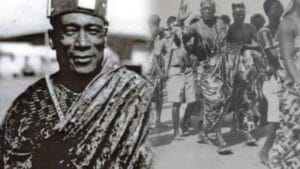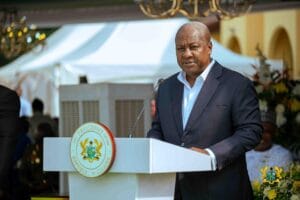
Recent findings presented by Attorney General Dr Dominic Akuritinga Ayine offer a concrete and troubling picture of how power, privilege, and personal relationships intersect to undermine public trust.
Three investigations involving Hanan Abdul-Wahab and Faiza Seidu Wuni, Kwabena Adu Boahene and Angela Adjei Boateng, and Gifty Oware-Mensah and Peter Mensah reveal a consistent pattern: the alleged conversion of public duty into private gain through coordinated schemes within state institutions.
At the National Food and Buffer Stock Company (NAFCO), former Chief Executive Officer Hanan Abdul-Wahab and his spouse, Faiza Seidu Wuni, stand at the centre of one of the most serious cases uncovered. Between 2017 and 2024, about ₵50.8 million in public funds meant for food supply and school-feeding programmes was allegedly diverted through companies linked to the couple, including Sawtina Enterprise, Alqarni Enterprise, Aludiba Enterprise, Fa Hausa Ventures, Energy Partners Ltd, and Aludiba Foundation.
According to the Financial Intelligence Centre (FIC), ₵40.49 million of these transfers were traced to the couple and related accounts: ₵16.17 million to Abdul-Wahab, ₵23.91 million to Alqarni Enterprise, ₵500,000 to Fa Hausa Ventures, and ₵550,000 to Chain Homes Ghana Ltd, a luxury developer. Seized assets include a five-bedroom residence valued at $1.6 million, a three-bedroom house ($600,000), a 17-bedroom hotel ($250,000), a four-bedroom home (₵4.1 million), and land estimated at ₵307,000.
Investigators found that the couple’s declared income, ₵14,000 to ₵28,000 for Abdul-Wahab and ₵5,000 for his wife, could not justify assets exceeding $5 million. Recovered items included 61 designer bags and watches worth about ₵1.5 million. They face charges of alleged stealing, conspiracy, abuse of office for profit, and money laundering.
A similar breach of trust defines the case of Kwabena Adu Boahene, former Director General of the National Signals Bureau (NSB), and his spouse Angela Adjei Boateng. The Attorney General’s investigations allege that ₵49.1 million, about $7 million, was misappropriated from a cyber defence contract with Israeli firm ISC Holdings Ltd that was never implemented. The funds were allegedly routed through Advantage Solutions Ltd and BNC Communications Bureau Ltd, both controlled by Adu Boahene and associates. His attempt to halt prosecution was dismissed by the High Court. The Attorney General described the case as a criminal operation within a security agency, underscoring the depth of impunity within institutions meant to protect the state.
In another major development, Gifty Oware-Mensah, former Deputy Executive Director of the National Service Authority (NSA), has been charged with stealing and money laundering in the ₵38 million ghost names scandal, part of the broader ₵653 million National Service payroll fraud. Between February 2022 and March 2024, she allegedly diverted ₵31.5 million through Blocks of Life Consult and ₵22.9 million through Amaecom Global, costing the state ₵6.9 million in interest. The Attorney General notes that the case, which began as a ₵653 million payroll discrepancy, has now risen to ₵2.2 billion after a forensic audit. Her husband, Peter Mensah, allegedly benefited from a state funded scholarship to Brunel University, London, covering £17,875 in tuition, £16,008 in living expenses, £8,160 as a spousal allowance, and airfare for both.
Taken together, these three cases form a troubling trilogy of corruption, a portrait of how love, loyalty, and privilege intertwined to drain the public purse. Each couple mirrors a pillar of national life in food security, intelligence, and youth service, and together they expose how personal networks and institutional frailty converged to turn public duty into private gain.
The Mahama led administration’s Operation Recover All Loot (ORAL) seeks to reverse this trend through collaboration among the Economic and Organised Crime Office (EOCO), National Intelligence Bureau (NIB), Financial Intelligence Centre (FIC), Auditor General’s Department (AGD), and the Office of the Special Prosecutor (OSP). The initiative has produced asset freezes, forensic audits, and prosecutions, marking a shift from political rhetoric to evidence based enforcement.
Yet these revelations raise troubling questions about the institutions meant to prevent such crimes. How did the Bank of Ghana, the GRA, the Internal Audit Agency, the PPA, and even the FIC miss the signs? What lapses within the Auditor General’s and Controller and Accountant General’s Departments allowed such transactions to pass unchecked? The negligence of oversight bodies is as damaging as the alleged crimes they failed to detect.
President Mahama has reiterated his call for the establishment of fast track courts dedicated to corruption and financial crime cases, aimed at expediting prosecutions and easing the backlog of economic offences. Such courts, supported by digital evidence systems and real time reporting, could provide the institutional speed and precision required to restore public confidence in justice.
Ghana’s fight against corruption will not be won through exposés alone. It will depend on whether institutions act with courage, independence, and speed. The challenge is not merely to name the culprits but to fix the systems that kept them invisible for so long.
Justice must not only be declared. It must be demonstrated.
Kay Codjoe.








